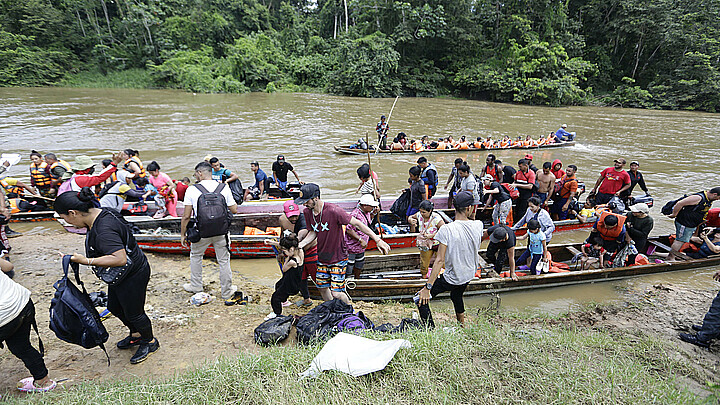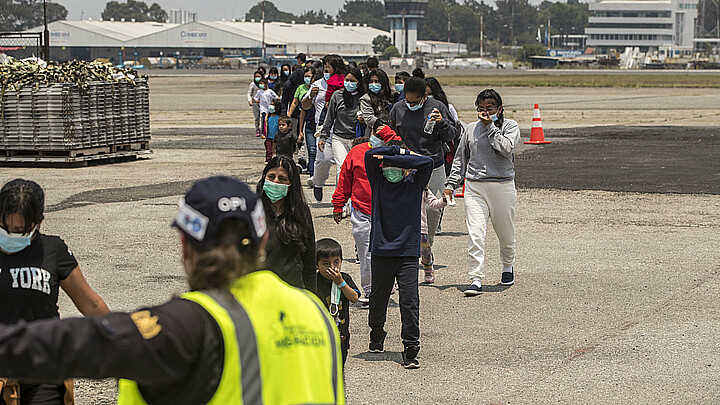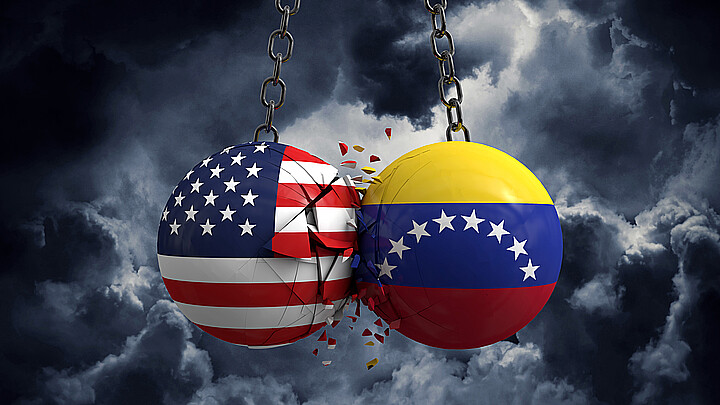Immigration
MENENDEZ: Venezuelans deported from U.S. face torture back home
In a recent statement, Democratic Sen. Bob Menendez said that it “is extremely disturbing” and can lead to “harsh consequences” for Venezuelans who are sent back"
February 11, 2022 4:45pm
Updated: February 12, 2022 1:05pm
After being deported by ICE through the Dominican Republic, dozens of Venezuelans say they were mistreated by authorities upon their return home. Many have once again started the long and treacherous journey back to the United States – but this time they’re hoping the government will grant them asylum.
The practice of using third-party countries to deport Venezuelans has been condemned by pro-immigrant organizations and U.S. lawmakers are sounding the alarm, ABC News reported.
In a recent statement, Democratic Sen. Bob Menendez said that it “is extremely disturbing” and can lead to “harsh consequences” for Venezuelans who are sent back.”
Ricardo Villasmil is one of the hundreds of Venezuelans sent back home through the Dominican Republic or Colombia – a tactic utilized by the Biden administration to get around the lack of diplomatic relations with the Maduro regime.
Speaking from an immigration detention center in Texas, the 23-year-old says he still suffers severe physical pain from the torture he suffered at the hands of Venezuelan security forces after being deported from the U.S. in October 2021.
“I told them to please help me, that I couldn’t get up, but they just looked at me and said: 'Don’t you come from the United States? Ask Biden for help now!'” he recounted about his arrival in Venezuela. “In the midst of so much harassment, I simply lost consciousness.”
Villasmil told Noticias Telemundo Investiga that officials were waiting for him when he landed at Maiquetia International Airport outside of Caracas.
“They said that I was being an infiltrator to pass information from the Maduro government to the United States, that the United States was financing my stay in Venezuela to pass information to him,” he said.
He also described the various torture methods used against him and recalls how he was forced to place his head between his knees for hours on end.
“I was in that position for more than seven hours. They poured cold water on me — it was like not leaving marks. They hit me in the head, they choked me," he said.
But when he fell to the ground, he says the jokes began.
Villasmil remembers officials saying, “You can’t stand anything, you were detained for four months in the United States, hold on” and “You don’t come from the United States? Ask Biden for help now.”
After countless hours of torture, the young migrant lost consciousness and woke up in a hospital. Although he felt lucky to be alive – and free-- a doctor later diagnosed him with cervical neuritis due to the abuse. Shortly after receiving his diagnosis, he was reunited with his partner, Daniela Viloria, who says armed groups organized and financed by the government had been looking for them for weeks.
Once, Villasmil recalls, they were threatened at gunpoint in the middle of a crowded street.
“He pointed a gun at me and they asked Daniela how she feels (knowing) that her son is going to grow up without a father," he said tearfully. "From there I thought: I can’t allow my son to be in the same way I grew up — without my dad."
Villasmil first fled Venezuela in 2008 after his father was murdered and the rest of the family was persecuted due to their opposition to the government of the late dictator, Hugo Chávez.
Due to the recent threats, Villasmil and his pregnant wife once again left their homeland in search for asylum in the U.S. They both managed to cross the border before being stopped by the U.S. Border Patrol, which separated them.
“I said: I am pregnant, this is my husband. And the voice of the Border Patrol said, ‘I don’t care, I don’t care, it doesn’t matter, you enter as single adults,’ his wife, Daniela Viloria, 24, told Noticias Telemundo Investiga.
Currently, Villasmil remains in the custody of U.S. Immigration and Customs Enforcement – but his wife was released and is currently in the process of applying for asylum.
During the last fiscal year, ICE deported, on average, a Venezuelan every two days, according to figures that the agency provided to Noticias Telemundo Investiga.
The Venezuelan American community is mobilizing to help deportees who are trying again to seek U.S. asylum.
“We do not want a Venezuelan brother to die because this country mistakenly deported him to Venezuela without taking into account the highly risky situations for Venezuelans' lives," community organizer Edison Calderón said.
He stressed that the U.S. is among the dozens of nations that don't recognize the Maduro government as legitimate. “We ask that these cases be reopened, taken into account, studied very meticulously,” Calderón, who obtained U.S. asylum, said.
“They return to the U.S. because we have no other option to protect our lives," he said of the deportees.
The State Department considers Venezuela to be “an illegitimate and authoritarian regime” whose authorities commit crimes against humanity.
For this reason, deportations through third countries have raised criticism.
“Under Maduro’s cruel regime, Venezuelans who are deported face a bleak future and in many cases suffer harsh consequences for seeking political asylum in the United States,” Menendez said in his recent statement.
During the 2020 presidential campaign, Joe Biden condemned the practice of deporting Venezuelans through third-party countries. Noticias Telemundo Investiga contacted the Biden White House regarding the deportation of Venezuelans but did not receive a response.










